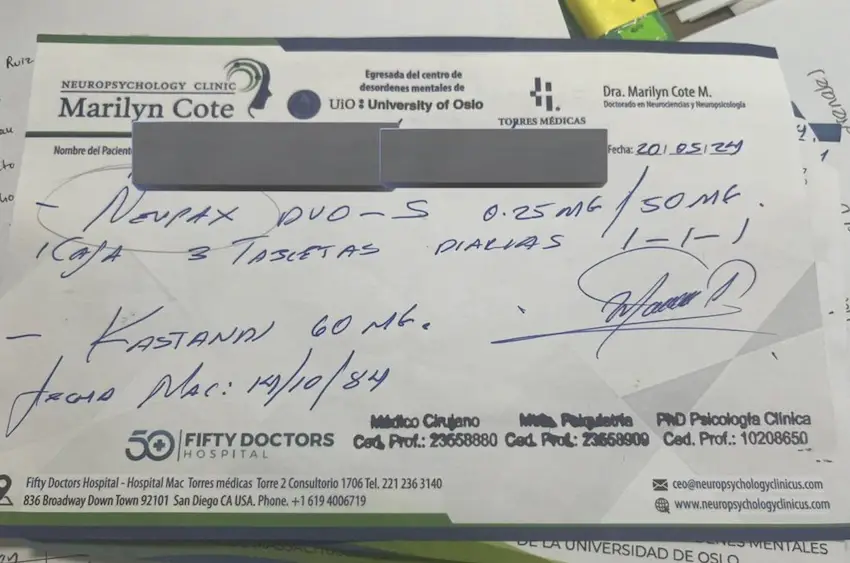A scandal in Puebla, where Marilyn Cote presented herself as an esteemed psychiatrist with eye-popping credentials, has been the talk of Mexico since late last week.
The uncovering of Cote’s apparently fake practice — at which she promised to cure depression “in six or seven days” and prescribed powerful psychotropic medications without a valid medical license — has highlighted the not-uncommon issue of medical impostors in Mexico.
3. Hace uso y abuso del Photoshop. Estas son fotos sacadas y aun publicadas en su Instagram profesional. https://t.co/jrnI0nrkHE pic.twitter.com/prPFaKTnNS
— Dr. Isaac Chávez Díaz (@DrChavezDiaz) November 7, 2024
On her social media accounts, Marilyn Cote posted photographs of herself and her staff that were obviously created using Photoshop.
Moreover, it has prompted real doctors and other officials to advise on how to avoid becoming a victim of such charlatans who find it easy to exploit regulatory loopholes.
Cote’s practice, in the Angelópolis Medical Towers in the city of Puebla, has been suspended by Mexico’s Federal Commission for the Protection against Sanitary Risks (Cofepris) and the Puebla Health Department.
That’s standard procedure in cases like this, but things often end there.
However, in part because her case has gone viral, the Health Ministry has given her five days to present valid degrees and medical credentials — or face additional sanctions.
“If she does not comply with requirements by Thursday, administrative sanctions, fines or a 36-hour arrest may follow, depending on the investigation’s findings,” said Araceli Córdoba Soria, head of the Puebla Health Department.
Though Cote has claimed affiliations with prestigious institutions like Harvard, the FBI and the University of Oslo, authorities have found no supporting evidence.
Rather, Cote, who is licensed only in law and psychology, allegedly operated an unlicensed mental health clinic and prescribed controlled medications such as Duloxetine and Quetiapine (Q-Mind) without a valid medical license.

Cote’s deceptions spanned social media, where she boasted of being “a renowned intellectual in Europe, the United States and Latin America” who could speak several languages (she apparently can’t). She claimed to have doctorates in neuroscience, neuropsychiatry and neuropsychology, and that she spent five years on the behavior analysis unit at Quantico University in Virginia (an institution that doesn’t exist) and was director of the Center for Mental Disorders at the University of Oslo.
What’s apparently true is that she graduated in 2000 as a lawyer from the Benemérita Universidad Autónoma de Puebla, and 12 years later, completed a master’s in criminalistics at Mexico’s Colegio Libre de Estudios Universitarios.
Her false claims began to unravel when a group of health care professionals exposed her online postings of fabricated degrees and certificates, as well as photoshopped images such as a résumé using the Harvard logo and a promo for her clinic that used images of foreign models implying they were on staff.
She showcased these items on her many social media accounts — which she has since shut down.
Her prescriptions bore forged license numbers for medical credentials she never held, enabling her to prescribe powerful antipsychotic drugs and major depressive disorder medications like Neupax and Kastandi.
Though media reports said none of Marilyn Cote’s patients ever filed an official complaint with a government agency, online reviews included numerous complaints, including allegations of false diagnoses and unsubstantiated claims about treating conditions like schizophrenia and depression in a matter of days.
Health policy expert Xavier Tello told the newspaper El País that Cote’s case highlights the systemic gaps that allow such fraud to proliferate. He cited outdated professional validation systems and limited authority for Cofepris to enforce penalties beyond clinic closures. Tello warned that without patient complaints, fraudulent practitioners like Cote can reopen elsewhere.
@alo_mendv #medicina #aprendeentiktok ♬ sonido original – Alondra Mendizabal
To check that your medical professional is who they say they are, you can verify their credentials through the National Registry of Professionals linked below.
How to avoid medical imposters in Mexico
To avoid falling victim to such charlatans, experts urge patients to verify the credentials of healthcare providers through the Registro Nacional de Profesionistas (National Registry of Professionals), a public database managed by the Public Education Ministry (SEP).
Users can enter a practitioner’s name or professional ID to confirm their certification and view details like their issuing institution and field of expertise.
Furthermore, discrepancies between listed licenses and those on prescriptions should raise red flags. Cofepris also encourages patients to report suspicious providers using its hotline at (800) 033-5050 or its online portal.
